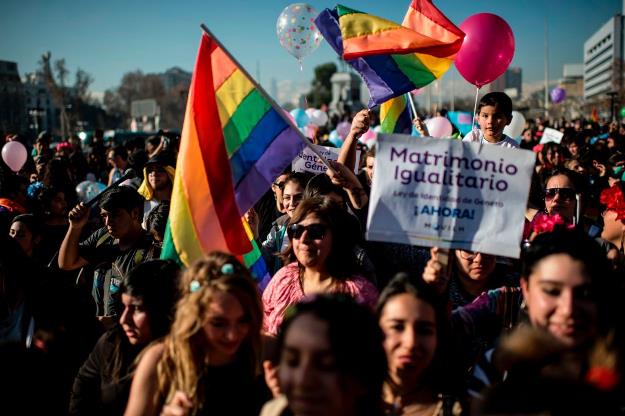With just six months left in office, Chilean President Michelle Bachelet’s progressive agenda may finally be taking shape.
On Aug. 28, Bachelet became the first Chilean president to propose legislation to extend the right to marry to same-sex couples. At a signing ceremony in Santiago, she said it was “neither ethical nor fair to put artificial limits on love.”
The proposal, which will go to Congress next week, comes as lackluster economic growth and a series of personal scandals have damaged the second-term president’s popularity. Some see Bachelet’s recent legislative push as a last ditch effort to boost her progressive bona fides, after largely failing to implement the widespread social reforms she campaigned on in 2013.
The gay marriage proposal follows other recent efforts to promote inclusive policies. On Aug. 21, Bachelet sent a bill to Congress that would revamp Chile’s migration law to make it more welcoming to the country’s growing immigrant population. Earlier this month, she scored a major legislative victory after Congress approved a proposal she first introduced in 2015 to allow abortion in some circumstances.
Bachelet first endorsed marriage equality during her campaign to return to the presidency in 2013. But, like many of the other reforms she promised at the time, it hasn’t been easy to see through. According to Patricio Navia, a political science professor at Santiago’s Diego Portales University and at New York University, if the bill passes it could serve as a “consolation prize” for Bachelet’s supporters, who are frustrated with a lack of progress elsewhere.
“By pushing these two initiatives – same-sex marriage and eased access to abortion – she is going to want to make up for some of the disappointment she’s caused, but I don’t think it’s going to be enough,” said Navia. “Her most progressive agenda item was a new constitution, and that’s pretty much gone.”
But others see Bachelet’s latest effort as a genuine reflection of her commitment to equality – and a recognition of evolving public opinion among Chileans on the issue of same-sex marriage. Multiple polls show a majority are now in favor of marriage equality.
“The marriage equality bill – as with the abortion and immigration efforts – is an expression of openness to diversity and tolerance in Chilean society,” said Sergio Bitar, a former minister under Bachelet and the president of the Foundation for Democracy in Chile. “The government is thinking in terms of making progress on all fronts and leaving a mark on history.”
Bachelet’s proposal on Aug. 28 marked the culmination of years of work by civil society organizations like the Homosexual Movement of Integration and Liberation (MOVILH), Chile’s leading LGBT advocacy group. Congress approved civil unions for gay couples in 2015, but MOVILH and others have kept pushing for the full equality that marriage would entail. According to Oscar Rementaría, MOVILH’s official spokesperson, the word “marriage” is mentioned in more than 6,000 laws in Chile whereas civil unions only appear in national legislation a small number of times.
“Marriage provides rights that civil unions do not,” Rementaría told AQ. “So there exists an institutional discrimination backed by the Chilean state.”
The ensuing debate is likely to be tense, given the fractured state of Bachelet’s coalition and the influence of conservative forces in Congress. Further, Bachelet’s bill would give same-sex couples the right to adopt, which is likely to be a sticking point for many in opposition to the bill, said Bitar.
Since Bachelet isn’t running in November’s presidential election, her status as an outgoing president won’t help the marriage effort’s chances, nor will her general unpopularity. Although her approval rating is trending upward, and in July hit its highest level in over two years, only 32 percent of Chileans approve of the job she’s doing.
The frontrunner to replace Bachelet is former president Sebastian Piñera. The center-right billionaire does not support passing marriage equality, putting added pressure on the bill’s proponents. Debate must move quickly to avoid the risk of Bachelet’s successor letting the bill die when he or she enters office on March 11.
Regardless of whether marriage equality passes during her administration, Bachelet’s stance on LGBT issues has been historic for the advances it has made for gay Chileans, said Rementería. Another bill sponsored by Bachelet would create a gender identity law, allowing for transgender Chileans over 18 to change their name and gender on official documents. After stalling for four years in the Senate, the lower house of Congress will begin debate on the proposal in September.
“Ultimately it will be history … that will assess the president’s image and actions,” Rementería told AQ. “However, we will always recognize her commitment to eradicate discrimination, especially with the marriage equality bill.”
—
O’Boyle is an editor for AQ








